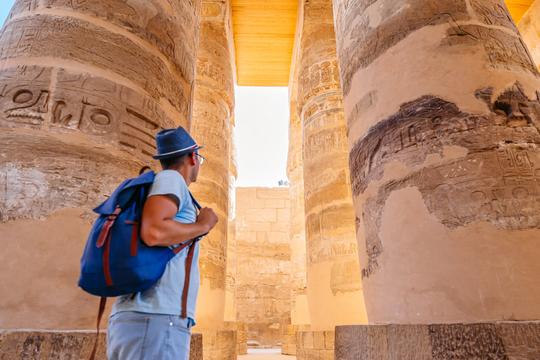
Mummies and baddies: exploring Egypt's top museums
Egypt’s history stretches back multiple millennia and artefacts are still being unearthed to tell the stories of its intriguing ancient rulers
An adventure story come to life, Egypt is a land of legends. Mysterious pyramids, tombs and temples painted with hieroglyphs render tales of mummies and pharaohs into reality. Alexandria, Cairo and Luxor – some of the ancient world’s most important cities – line the Mediterranean coast and the River Nile, the giver of life in this otherwise bone-dry landscape. Egypt’s history impresses, but it’s often encounters with hospitable, enterprising locals who leave travellers with lasting memories.
Almost all nationalities require a visa to enter Egypt, and you can easily get one online before you travel at a cost of USD $25 or upon arrival.
Visa requirements may change, for the most up-to-date information we recommend using our Entry Requirements tool. Alternatively, check the Egyptian embassy website in your country of departure.
Please note that a yellow fever vaccination is required upon entry if you’re travelling from these countries in Africa and Latin America.
Other vaccinations to consider include hepatitis a, hepatitis b, rabies, tetanus, typhoid, and polio.
As advice can often change, you can check out our Entry Requirements tool for the most up-to-date details on vaccination requirements.
While Egypt is hot and sunny all year round, the months of May to September are when temperatures really reach their peak — often topping 40°C (104°F). For more pleasant temperatures, make your way here during the months of October to March. March to May and September are the best times to visit if you’re looking to avoid the crowds.
Hot, hot, hot in a word! Temperatures in Egypt rarely dip below 10°C (50°F), and highs in June and July average 34°C (93.2°F). The coolest month of the year is January, when temperatures tend to hover around 20°C (68°F) — the warmest is July, when it can get up to 40°C (104°F).
There’s not really much rainfall here — December, when it rains the most, averages just seven millimetres (0.28 inches).
Tipping is common practice in Egypt, and it’s standard to tip 10 to 15% in restaurants and cafes. In markets or at local food stalls, loose change is fine too.
To make things as easy as possible and avoid embarrassing situations, G Adventures uses a tipping kitty system where your CEO collects a contribution from everybody at the start of your tour. It's used to tip anybody providing services to the group as a whole. On Day 1 of your tour, your CEO will share the amount needed from everybody to form the tipping kitty for your trip.
At the end of your trip if you felt that your G Adventures CEO did an outstanding job, tipping is also expected and appreciated. The precise amount is entirely a personal preference; however, USD $6-9 per person, per day can be used as a general guideline.
Internet access in Egypt is fairly widespread, and even the smallest village tends to have a connection. Please note though that the quality and download speed may vary.
ATMs are widely available throughout Egypt, and in the Red Sea region, most hotels tend to have them too. Visa and Mastercard are widely accepted. Expect withdrawal fees and a maximum daily limit of EGP 4,000.
Cash is recommended for times when ATMs are not accessible. Euros, British Pounds, and US Dollars are all easy to exchange into the local currency.
As currency exchange rates can fluctuate often we ask that you refer to www.xe.com for daily exchange rates.
Even though it’s not the most LGBTQ+-friendly destination in the world, you can still enjoy a visit here if you identify as LGBTQ+. Just don’t outwardly flaunt your sexuality and you should be fine.
As part of their commitment, all CEOs receive LGBTQ+ inclusion training so every traveller feels respected and welcomed on all of our tours. We commit to making our tours a safe and inclusive place for people to express their authentic selves without judgment, free from any discriminatory language or harassment.
While travelling with G Adventures, all travellers must treat each other with dignity and respect to create an environment that is positive, safe, and where everyone feels welcome. You can find out more via our LGBTQ+ travel page.
The official language of Egypt is Arabic, and various different dialects are spoken throughout the country. Other languages spoken here include Domari, Nobilin, Beja, and Siwi.
Drinking tap water is not recommended in Egypt — particularly in rural areas — so buying bottled water is the way to go. Cairo, due to its heavily-chlorinated water, should technically be ok, but we still wouldn’t recommend drinking it.
Please note however that all drinks provided on our tours are safe to drink (including drinks with ice), as well as the water in most hotels and restaurants visited on the tour. If in doubt, please ask your CEO for further info.
Crime is fairly low in Egypt, and the main tourist areas tend to be pretty safe. There's the occasional threat of terrorism and certain tourist scams here, but as long as you keep your wits about you, you shouldn't have problems. Solo female travellers should stick to well-lit streets at night and ideally travel in groups if possible.
G Adventures takes all reasonable measures to ensure your safety and enjoyment while travelling with us. All of the included activities are properly vetted and regularly checked by us, and we take great care in choosing the right transportation, stays throughout your trip, and guides to lead your tour. However, there are always inherent risks when travelling — you can find out more via our travel safety page.